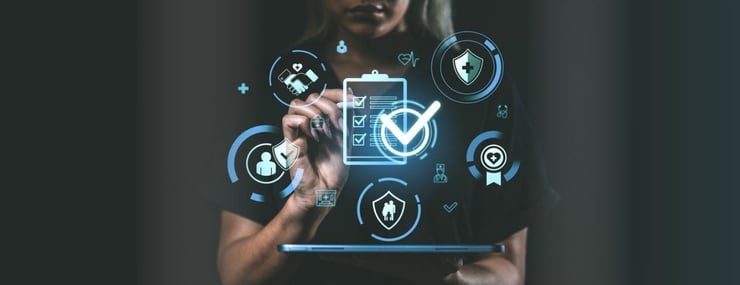Flexible working hours. Mental-health awareness training. Employee assistance programs and surveys. These are some of the most common tactics that employers use to support mental health. But are they enough?
A recent report published by McKinsey says no. Their researchers identified multiple areas of “disconnect,” where employers’ perceptions of their mental health support significantly differed from employees’ perceptions.
- 65% of employers said that employee mental health was supported well or very well. Only 51% of employees said the same.
- 31% of employers said that improving access to mental health support was a priority. But 67% of employees with a mental illness reported that it was challenging for them to access care.
- Only about half of employers reported that mental health is a top priority for their organizations.
The good news: Most employers said that they plan to continue or expand their mental health support in the coming year.
Mental Health Finally Takes Priority
Covid-19 certainly brought the issue of employees’ mental health to the forefront. A study conducted by Workplace International and Oracle revealed that 70% of employees considered 2020 the most stressful year of their work lives, and 78% of the global workforce reported that they were negatively impacted by mental health.
Although the coronavirus crisis may be drawing to an end, employee mental health remains a top concern for HR leaders. And it’s about time -the connection between mental health and job performance has long been well documented, and the implications are far-reaching. In the US alone, it is estimated that stress causes about 1 million absences per day, which carries a considerable cost for businesses. But absenteeism is only one of many potential negative outcomes:
- Decreased productivity
- Loss of concentration and poor decision making
- Increased workplace accidents
- Higher medical costs, due to stress-related physical health problems
A company’s mental health program can even impact talent acquisition and employee retention. A 2019 study conducted by Aetna showed that about 66% of employees would not consider working for a company that didn’t have a clear policy for supporting employees’ mental health. Furthermore, 89% of employees said they’d stay with an employer longer if the employer-provided mental health support.
But perhaps the most compelling argument for addressing employees’ mental health is the return on investment. Research from Deloitte Canada showed that companies that had a mental-health program in place for one year enjoyed an average ROI of $1.62 for every dollar spent. Companies whose programs were in place for three or more years saw ROI of $2.18 for every dollar spent.
Conversational AI Can Deliver Employee Support
There are plenty of options for HR leaders who wish to invest wisely in mental health programs. Solutions range from meditation and wellness apps to wearable fitness monitoring. Yet supporting employees’ mental health can present challenges. Help must be available “just in time,” that is when employees actually need it. And any solution must be scalable so that it’s easily accessible for all employees, regardless of changes in company size.
This is where conversational AI chatbots can play an important role. According to the Workplace International and Oracle study, 82% of employees said that AI is actually better than humans at providing mental health support. And 68% said that for issues like stress and anxiety, they would prefer to speak with a robot, instead of a manager. These findings make sense, given the enduring stigma associated with mental health; employees are reluctant to be perceived as having “issues,” which might impact their career opportunities.
Conversational AI eliminates this risk by providing an anonymous, confidential solution for employees. Additionally, robots can be available 24 hours a day, and they can easily be scaled to support even the largest organizations. And they provide helpful, relevant guidance without any biases related to an employee’s race, gender, or other demographics.
It might seem reckless or overly ambitious to trust an AI chatbot with something as important as employees’ mental health. But early research is promising, and these aren’t conventional rules-based chatbots, which offer limited capacity for complicated or nuanced communication. Conversational AI provides robust, flexible communication that mimics human interaction, with the help of a few key features:
- Multiple modalities: Conversational AI chatbots can interact with users via text or voice. This ability can help users feel more comfortable since they are interacting in the communication style of their choice.
- Natural language understanding: As these chatbots have more interactions, they learn how to communicate better, and more naturally. They also learn how to understand more complicated requests.
- Sentiment analysis: Conversational AI can learn how to infer a user’s emotions based on word choice, tone, pace, and other factors. This can be especially useful in the context of mental health support.
AI chatbots trained for Human Resources use these capabilities to generate personalized responses based on cognitive-behavioral techniques (CBT). They ask users direct questions; evaluate the user’s mood and thoughts, and guide the user to available solutions.
Chatbots Offer Indirect Mental Health Benefits
But mental health chatbots aren’t the only way that AI can help employees. More conventional applications can also contribute to better mental health outcomes. Science shows that monotonous work can contribute to elevated stress and burnout (and boredom is a leading reason that people seek a new job). Chatbots and digital assistants can help eliminate the repetitive tasks that take up employees’ time and leave them feeling bored.
In this context, chatbots can often be used in multiple applications across the enterprise. A few popular use cases include the following:
- HR: Recruitment, onboarding, answering common questions about employee benefits, generating contracts, and even qualifying interview candidates
- Sales: Qualifying and classifying leads; optimizing engagement, or instantly collecting data
- IT Support:
- Marketing: Managing expenses, scheduling appointments, generating documents, checking budgets, and automating performance management
Additional AI-Powered Mental Health Solutions Continue to Emerge
Chatbots are not the only way that AI can power better mental health. A wide variety of technologies are now available for savvy HR leaders.
- Well-being technology incorporates stress sensors and emotion recognition to monitor employees’ emotions. AI-enabled wearables can even use voice and image recognition, along with natural language processing.
- AI-enabled monitoring software uses machine learning algorithms to identify stressed customer service agents based on the speed and tone of their voices.
- “Smart offices” use sensors to monitor employees’ emotions and modify the office conditions accordingly, such as adjusting the temperature or level of natural light over the course of the workday.
Conversational AI offers a promising option for HR leaders who seek a scalable, accessible way to support employees’ mental health. Coupled with more conventional interventions, conversational AI can be an integral part of a robust mental-health program that fits employees’ needs and preferences.





